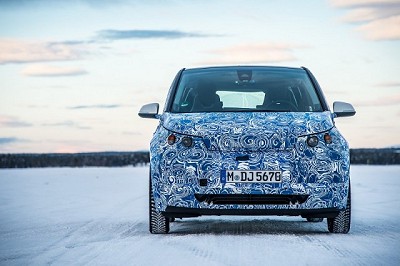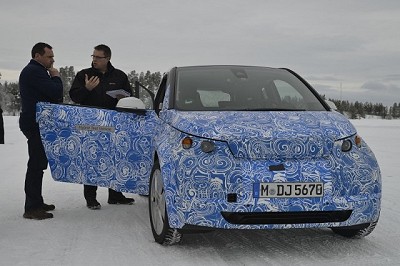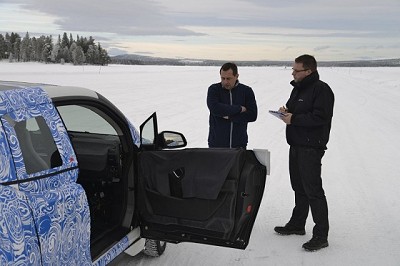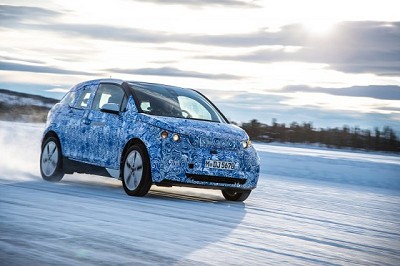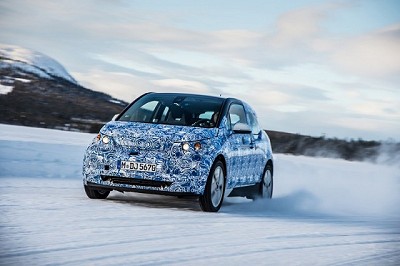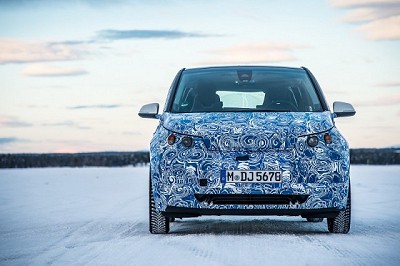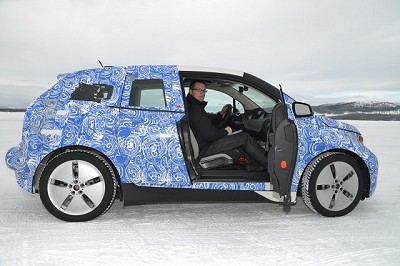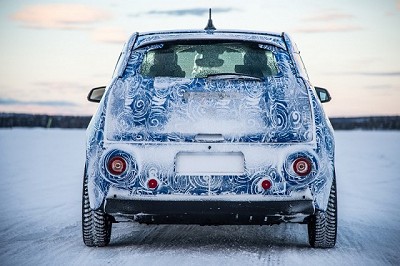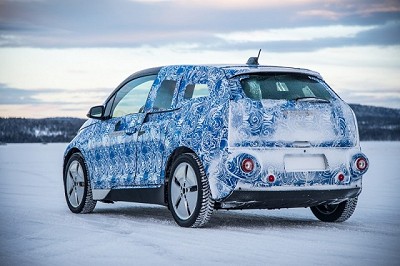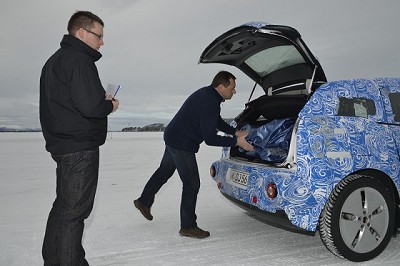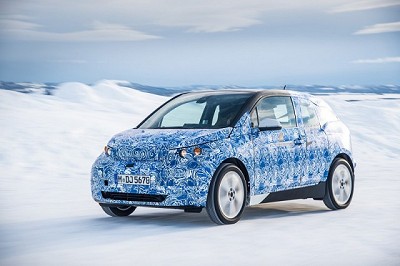When: February 2013
Where: Arjeplog, Northern Sweden
What: BMW i3 prototype
Occasion: International first drive
Key Facts
Model tested: BMW i3 Concept
On sale: late 2013
Engine: 125kW electric motor
Transmission: rear-wheel drive, single-speed automatic
Body style: five-door hatchback
CO2 emissions: 0g/km (Band A0, €120 per annum)
Range: 225 kilometres (FTP72 cycle), 130 - 160 kilometres (everyday range)
Top speed: 150km/h (electronically limited)
0-100km/h: sub-7.0 seconds
Power: 170hp
Torque: 250Nm
At first I think the wheels are special winter sizes, their diameter and width so greatly exaggerated from the norm they're more befitting of a chariot than a city car. As standard the BMW i3 will come with 19-inch forged rims (though twenties are optional) and they use specially developed Bridgestone tyres of 155/70 profile.
Like much of the car, it's only a small detail, but it's soon clear it has more than a bit-part in the final outcome. Once rolling, the large wheels require less energy to keep them turning, contributing to a greater overall range for the all-electric car. They make for a better turning circle too, the thinner wheels allowing a more extreme angle on full lock (helped further by the lack of engine or ancillaries in between) and the i3 can turn around in less than 10 metres. It makes the city car impressively agile and this is indicative of the attention to detail to be found in this vehicle.
Unlike a conversion car, where an existing model is re-engineered to accept an electric powerplant, the BMW i3 was designed with EV power in mind (though a range extender option is imminent). And because of that there's a host of neat details and engineering flourishes to be taken in. First of all I need to get into it, but the blue and white wrap is fouling the rear coach doors. Once cracked open it's clear the interior is on the spacious side; in fact it's as wide as a BMW 7 Series in there so I don't need to brush shoulders with my driver - Uwe Gaedicke, the man who set up the suspension on the car we're riding in.
We sit high, listening for the faint whine of the 125kW electric motor as our speed increases, though the noise is only evident under load or at higher velocity. It's incredibly smooth, the linear but instant delivery of performance and single-speed gearbox, making it feel stronger than the figures would suggest - though the firm says it'll do 0-100km/h in less than seven seconds.
The i3 might be a car designed for city life, but it doesn't feel out of place here in the whiteout that is Arjeplog and BMW's test facility in Sweden. We stop on an icy hill, the winter compound rubber gripping hard and holding us steady, before Uwe demonstrates the car's hill-hold control and its smooth take-off on the angle - unlike some electric models there's no stuttering here.
And ending up on the handling circuit, carved out of the frozen lake, the i3 continues to impress. Despite the relatively lofty proportions it feels just as stable and quick to change direction as any other BMW product. Gaedicke points to the relatively low 1,250kg kerb weight and sophisticated suspension set-up as the reason it does so well. The five-link design is based on the same layout as that found in the 1- and 3 Series, but uses a specially designed mounting system and bespoke bushes.
A 49/51 front-to-rear weight distribution is achieved thanks to the rear-mounted electric motor sitting above the driven axle; the decision not to use the front-wheel drive platform was made not just for packaging reasons but also because it fell in line with the BMW ethos. And despite our disappointment that the Dynamic Stability Control (DSC) can't be fully disengaged the city car is clearly fun to pilot, the rearward bias obvious on the ice circuit. Slight understeer gives way to mild oversteer if provoked and the system allows just enough slip to have some fun before it cuts back in. It's not enough to drop donuts on the tarmac, despite the instant torque on offer, but the i3 still impresses in this situation.
And key to this car's appeal is its ability to impress across the board. Every test that we were present for the i3 either handled without issue or surpassed expectations in. Whether it is inner-city mobility or big-car refinement the electric i3 seems to have it all, and as the world's first proper premium brand electric vehicle we can't think of anything more enticing for the new environmentally conscious world we live in.

